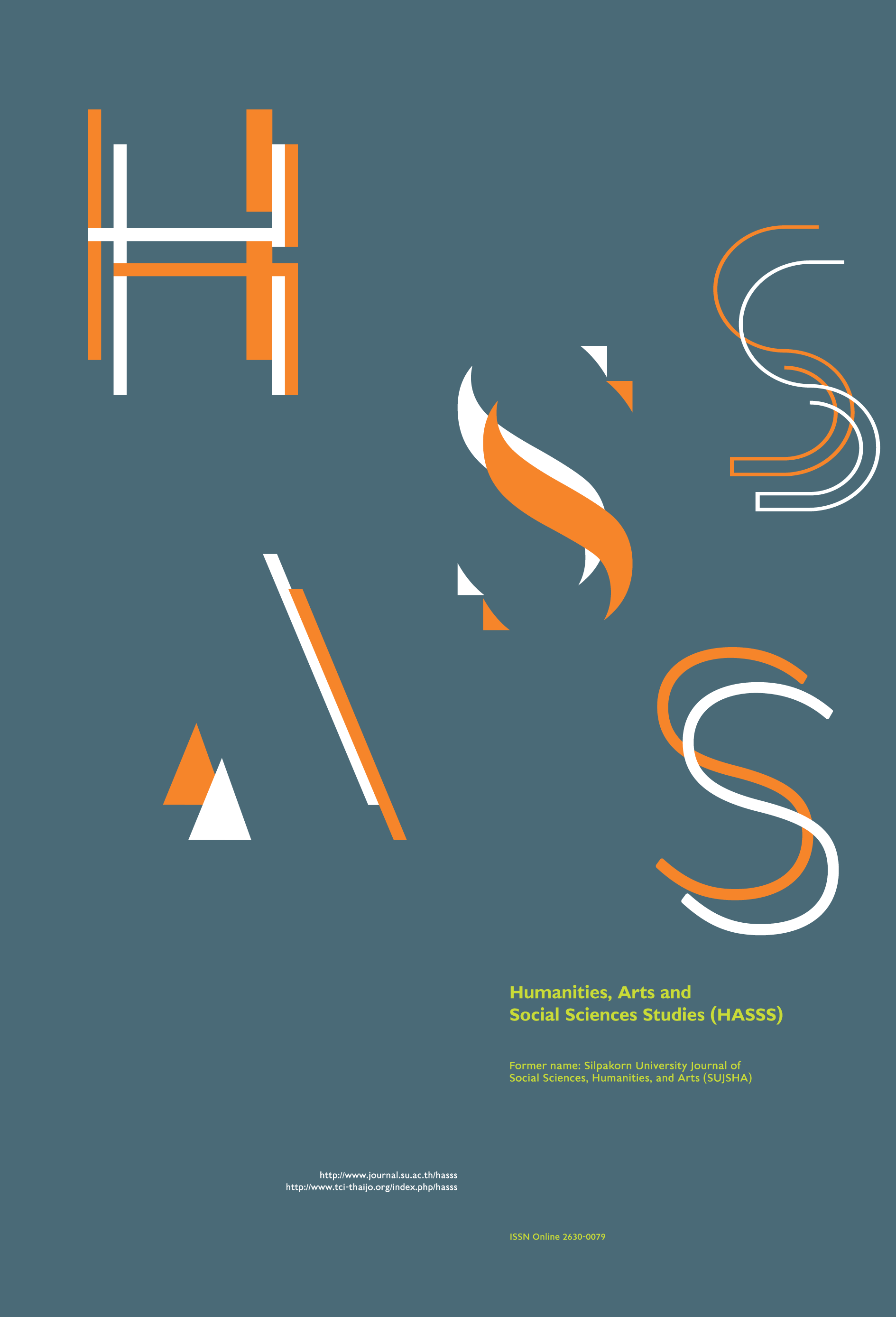Proposed strategies to strengthen community participation in community learning centers in The Kingdom of Cambodia
Main Article Content
Abstract
This descriptive research aims to propose strategies to strengthen community participation in community learning centers (CLCs) in the Kingdom of Cambodia. This research study contains two phases of procedures: 1) to explore the issues of community participation in CLCs in Cambodia by conducting the semi-structured interview and doing observation with Cambodian experts and 2) to identify strategies to strengthen community participation in CLCs in Cambodia by interviewing, analyzing, and synthesizing previous and current policies, strategies, mechanisms and the discourses of the Cambodian experts. The study revealed the following results. There are many problems of community participation which are caused by two main actors such as government levels (the lack of facilities and transparency, conventional teaching curriculum, the limited knowledge of facilitators, and administrative staff, shortage of allocated budgets, no clear career pathway and deficiency of disseminating information) and grass-rooted levels (the lack of understanding about CLCs, trust, and sense of belonging, family's burdens, caring about their businesses, traditional cultures, and migration). Moreover, there are also many suitable strategies, such as monthly diagnosing needs with community people, strengthening leaderships and facilitator's capacity building, disseminating enough information, increasing resource mobilization, updating their teaching curriculum, linking one CLC to others, having a clear career pathway for participants, and putting the problems of community people into solution.
Downloads
Article Details
All rights reserved. Apart from citations for the purposes of research, private study, or criticism and review,no part of this publication may be reproduced, stored or transmitted in any other form without prior written permission by the publisher.
References
Asian Development Bank (ADB). (2019). Economic Indicators for Cambodia. [Online URL: https://www.adb.org/countries/cambodia/economy] accessed on January 23, 2020.
Department of Non-Formal Education (DNFE). (2000). Community Learning Centers in Cambodia Report. Phnom Penh: Ministry of Education, Youth and Sport.
DNFE. (2014). Report on Non-formal Education, 2014. Phnom Penh: Ministry of Education, Youth and Sport.
DNFE. (2018). Report on Non-formal Education, 2018. Phnom Penh: Ministry of Education, Youth and Sport.
Duncan, A. (2013). Education: the Most Powerful Weapon for Changing the World. [Online URL: https://blog.usaid.gov/2013/04/education-the-most-powerful-weapon/#:~:text=As%20Nelson%20Mandela%20says%2C%20%E2%80%9CEducation,illness%2C%20and%20to%20fostering%20peace] accessed on January 12, 2020.
DVV International. (2018). Basic Non-Formal Education in Rural Areas. [Online URL: www.dvvinternational.la/cambodia/our-projects/basic-non-formal-education/] accessed on February 2, 2020.
Hun, S. (2015). The Cambodia Community Learning Centers: Challenges and Future Directions. Master’s Thesis. Royal University of Phnom Penh, Cambodia.
Hürsen, Ç. (2016). A scale of lifelong learning attitudes of teachers: the development of LLLAS. Cypriot Journal of Educational Sciences 11(1): 21-36.
Kanno, K. and Shrestha, A. (2006). Community Empowerment Through Community Learning Centers in Mid and Far Western Regions of Nepal. Kathmandu: UNESCO.
Merriam, S. B. and Tisdell, E. J. (2016). Qualitative Research: A Guide to Design and Implementation. 4th ed. San Francisco: Jossey-Bass.
Ministry of Education, Youth and Sport (MoEYS). (2014). Manual for Management of Community Learning Center (CLC). [Online URL: https://unesco.or.jp/terakoya/result/pj/khn/pdf/CLC%20Manual_2014.pdf] accessed on February 2, 2020.
MoEYS. (2019). Cambodia's Education 2030 Roadmap. Phnom Penh: MoEYS.
Nan-Zhao, Z. (2006). Four ‘Pillars of Learning’ for the Orientation and Reorganization of Curriculum: Reflections and Discussions. Geneva: International Bureau of Education, UNESCO.
Nop, S. and Thornton, A. (2020). Community participation in contemporary urban planning in Cambodia: the examples of Khmuonh and Kouk Roka neighbourhoods in Phnom Penh. Cities 103: 102770. [Online URL: https://doi.org/10.1016/j.cities.2020.102770] accessed on January 24, 2020.
Pich, N. (2008). Community Learning Center Development in Cambodia: The Case of Ksert Commune in Svay Rieng Province. Master’s Thesis. Royal University of Phnom Penh, Cambodia.
Ross, R. R. (1987). Cambodia: A Country Study. [Online URL: http://countrystudies.us/cambodia/] accessed on January 12, 2020.
Royal Government of Cambodia (RGC). (2019). National Policy on Lifelong Learning. Phnom Penh: Ministry of Education, Youth and Sport.
Saory, P. (2002). History of Literacy in Cambodia. Leisure Cambodia. [Online URL: www.leisurecambodia.com/news/detail.php?id=106] accessed on January 12, 2020.
Shaeffer, S. (1994). Participation for Educational Change: A Synthesis of Experience. Paris: UNESCO.
UNESCO. (1999). Manual for the implementation of community learning centres. [Online URL: https://unesdoc.unesco.org/ark:/48223/pf0000121155?posInSet=1&queryId=d56c9782-4070-45b6-af99-4d5e2ad5897d] accessed on January 2, 2020.
UNESCO. (2008). Community Learning Centres: Country Report from Asia. Bangkok: UNESCO.
UNESCO. (2010). World Data on Education. France: UNESCO. [Online URL: https://unesdoc.unesco.org/ark:/48223/pf0000193177?poslnSet=3&queryld=a89b88f8-e165-42fa-aeaf-7b88be0ea435] accessed on January 2, 2020.
UNESCO. (2011). Sustainability of Community Learning Centers: Community Ownership and Support. Bangkok: UNESCO.
UNESCO. (2015). Global Education Monitoring Report. [Online URL: https://en.unesco.org/gem-report/sdg-goal-4] accessed on January 2, 2021.
UNESCO. (2017). Community Learning Centers in Nepal: Status and Recommendations. [Online URL: https://un.info.np/Net/NeoDocs/View/7660] accessed on February 4, 2020.
UNESCO, UNICEP, World Bank and UNDP. (2015). Education 2030 Incheon Declaration Towards Inclusive and Equitable Quality Education and Lifelong Learning for All. Incheon: UNESCO.
Yasunaga, M. (2014). Non-Formal Education as a Means to Meet Learning Needs of Out-of-School Children and Adolescents. Montreal: UNESCO Institute for Statistics.


